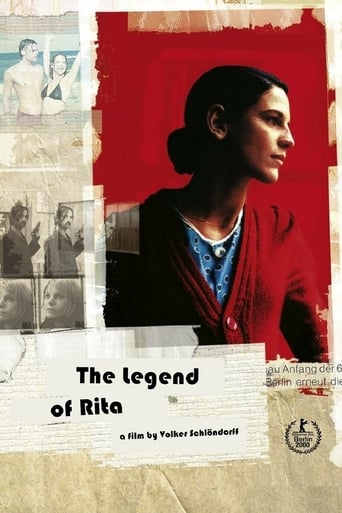tmdaines
Drawing parallels with real members of the RAF far-left militant group and events of the 70s and 80s in Germany, Die Stille nach dem Schuss depicts the relationship between the terrorist organisation and the East German Stasi through the eyes of an individual. Rita Vogt seeks refuge in the GDR after becoming the target of a manhunt following a prison break gone wrong. Rita is shown to be unique in her unconditional love for the supposed values of her adopted homeland, standing in stark contrast to her fellow citizens, all of whom refuse to have the wool pulled over their eyes. The film lacks both the style and thrills of Der Baader Meinhof Komplex (2008) or any real sustained drama. Much of the time you find yourself lacking empathy for the characters and unmoved by the lack of much suspense or action. Arguably this indifference and coldness from the audience to the East is intended at times, but at others there is something lacking. Just when it seems the stakes are to be raised in Rita's personal life, the narrative moves on too soon.
Emil Bakkum
The film "Die Stille nach dem Schuss" has the problem, that the audience can neither identify with the characters nor with the society. Some of the characters are German city guerrillas and thus loose cannons, not much different from violent criminals. The other characters are Stasi officers, the Bolshevist equivalent of the CIA. And the society is the Bolshevist dictatorship GDR, which was never a very pleasant place to live in. Still my knowledge about the setting is above-average. I have read the book Der Baader Meinhof Komplex by Stefan Aust (670p.), which is a leading work on the subject. I even read "Ulrike Meinhof und die deutschen Verhaeltnisse" by Peter Bruecker, which contains many fragments of the writings of Meinhof. It did not make me any wiser with regard to the ideas, that motivated this (European!) movement. Terrorism is not exceptional, but always sectarian and therefore escapes the common sense. Somehow some groups in our society experience state oppression to such an extent, that in their view the situation escalates into a hidden war. It is the paradox, that ordinary people like police officers become their primary target. Even in Utrecht, my residence, a constable was killed by a RAF member, in a situation similar to the French officer from the film. In addition I have read enough about the GDR to appreciate the living conditions. In spite of the revolutionary facade the GDR society was actually more rigid than for instance the USA. In fact this region had always been the most conservative part of Germany, so that the contempt for former terrorists in the film is probably authentic. The party elite consisted of oppressive bureaucrats but cherished its own terrorist past and was probably indeed sympathetic (and suspicious) towards western terrorists. So in general the atmosphere of the film looks credible. It is a pity that the narrative does not elaborate on Ritas scruples, or perhaps the absence of them, with respect to her past deeds. It may be that she represses these thoughts, but we don't know. All in all she seems to enjoy herself. I don't know whether former RAF members had happy lives in the GDR. If so, one of course wonders why they didn't migrate in the first place. Although the story was not a revelation to me, it didn't bore me either. The scenes of GDR life, the collective company holidays, the community singing, the droll corporate life, and the stage properties (Trabant, Wartburg cars, 60s furniture) are sufficiently realistic to allow for recognition. Unfortunately, the endings of the Schlondorff films that I have seen (Die verlorene Ehre der K. Blum, Strajk!) are never a true climax, and this weakness also holds for this one. The killing of Rita on a motor bike is banal, and an ending without ambition, except perhaps a faint attempt to restore justice. In conclusion, the film has its merits in that it is credible and captivating. However, I would not call it an intellectual masterpiece. I guess that Schlondorff shared my inability to sympathize with his characters, and therefore could not connect with their thoughts. If you are interested in GDR life or social films, consider seeing my other reviews.
bubblegumyums65
(Spoiler?)I really liked this movie. I thought that the filming and photography was wonderful. I really like the plot also.The people were not that great looking, but they acted well. I'm not too sure on that whole lesbian thing that went on. That kind of freaked me out. What I didn't like about this movie was the ending. All I could think was WHY?! WHY DID THIS HAVE TO HAPPEN?! Anyways, it was an overall good movie. I recommend this movie to anyone who likes to go through a crazy adventure.
psteele
Schlondorff has no strong sense of what to make of his terrorist characters. Rita is idealistic but her personal life is pulled in rather conventional bourgeois directions. The film points to the paradox of idealistic murder and suggests that society has no ability to appreciate the complexity of such a character, but why should it when even a work of art like this film is unable to explore what's inside its title character. A muddled film about a muddled time.



